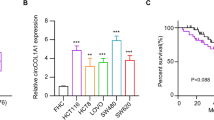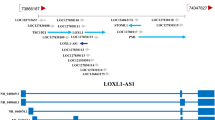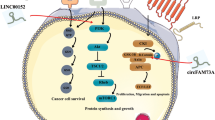Abstract
Long non-coding RNAs (lncRNAs) are a class of non-coding RNAs that play important roles in cancer development and progression. Prostate cancer-associated transcript 1 (PCAT-1) is a novel lncRNA that promotes cell proliferation in prostate cancer. We hypothesized that PCAT-1 also have roles in bladder cancer. In this study, we found that PCAT-1 was up-regulated in bladder cancer compared to paired normal urothelium. Cell proliferation inhibition and apoptosis induction were also observed in PCAT-1 small hairpin RNA (shRNA)-transfected bladder cancer T24 and 5637 cells. Our data suggest that PCAT-1 plays oncogenic roles and can be used as a therapeutic target for treating human bladder cancer.




Similar content being viewed by others
References
Kaufman DS, Shipley WU, Feldman AS. Bladder cancer. Lancet. 2009;374(9685):239–49.
Cheng L, Davison DD, Adams J, Lopez-Beltran A, Wang L, Montironi R, et al. Biomarkers in bladder cancer: translational and clinical implications. Crit Rev Oncol Hematol. 2014;89(1):73–111.
Chen LL, Carmichael GG. Decoding the function of nuclear long noncoding RNAs. Curr Opin Cell Biol. 2010;22(3):357–64.
Shi X, Sun M, Liu H, Yao Y, Song Y. Long non-coding RNAs: a new frontier in the study of human diseases. Cancer Lett. 2013;339(2):159–66.
Prensner JR, Iyer MK, Balbin OA, Dhanasekaran SM, Cao Q, Brenner JC, et al. Transcriptome sequencing across a prostate cancer cohort identifies PCAT-1, an unannotated lincRNA implicated in disease progression. Nat Biotechnol. 2011;29(8):742–9.
Ge X, Chen Y, Liao X, Liu D, Li F, Ruan H, et al. Overexpression of long noncoding RNA PCAT-1 is a novel biomarker of poor prognosis in patients with colorectal cancer. Med Oncol. 2013;30(2):588.
Prensner JR, Chen W, Iyer MK, Cao Q, Ma T, Han S, et al. PCAT-1, a long noncoding RNA, regulates BRCA2 and controls homologous recombination in cancer. Cancer Res. 2014;74(6):1651–60.
Prensner JR, Iyer MK, Sahu A, Asangani IA, Cao Q, Patel L, et al. The long noncoding RNA SChLAP1 promotes aggressive prostate cancer and antagonizes the SWI/SNF complex. Nat Genet. 2013;45(11):1392–8.
Feldstein O, Nizri T, Doniger T, Jacob J, Rechavi G, Ginsberg D. The long non-coding RNA ERIC is regulated by E2F and modulates the cellular response to DNA damage. Mol Cancer. 2013;12(1):131.
Prensner JR, Chen W, Han S, Iyer MK, Cao Q, Kothari V, et al. The long non-coding RNA PCAT-1 promotes prostate cancer cell proliferation through cMyc. Neoplasia. 2014;16(11):900–8.
Acknowledgments
The authors are indebted to the donors, whose names were not included in the author list, but who participated in this program. This work was funded by the National Key Basic Research Program of China (973 Program) (2014CB745201), National Natural Science Foundation of China (81402103, 81100460), Basic Research Program of Shenzhen (JCYJ20120614155650545), Shenzhen Foundation of Science and Technology (GJHZ20140414170821192, JCYJ20140414170821337), and “San Ming” Project for Medical Treatment and Public Health at Shenzhen.
Conflicts of interest
None
Author information
Authors and Affiliations
Corresponding authors
Additional information
Li Liu and Yuchen Liu contributed equally to this work.
Electronic supplementary material
Below is the link to the electronic supplementary material.
ESM 1
(DOC 63 kb)
Rights and permissions
About this article
Cite this article
Liu, L., Liu, Y., Zhuang, C. et al. Inducing cell growth arrest and apoptosis by silencing long non-coding RNA PCAT-1 in human bladder cancer. Tumor Biol. 36, 7685–7689 (2015). https://doi.org/10.1007/s13277-015-3490-3
Received:
Accepted:
Published:
Issue Date:
DOI: https://doi.org/10.1007/s13277-015-3490-3




